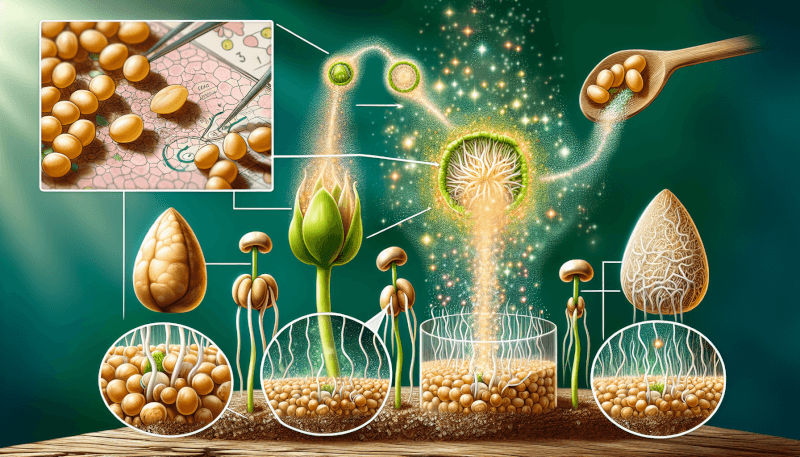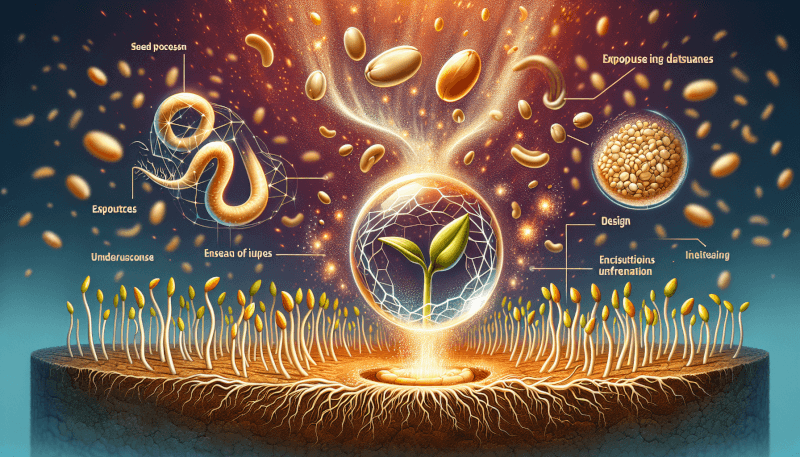Imagine if there was a secret ingredient that could unlock the hidden potential of your seeds, helping them grow stronger, faster, and healthier. Well, look no further, because Sprouting Seeds Enzymes is here to revolutionize your gardening experience. These powerful enzymes work their magic by activating the dormant nutrients within the seed, kickstarting the sprouting process and ensuring optimal growth. Whether you’re a seasoned gardener or just starting out, Sprouting Seeds Enzymes is the key to transforming your plants into vigorous, thriving wonders. Get ready to witness the remarkable power of nature at work!

The Importance of Sprouting Seeds Enzymes
Sprouting seeds enzymes play a crucial role in our overall health and well-being. Enzymes are specialized proteins that facilitate various biochemical reactions in our bodies. They act as catalysts, accelerating the rate at which these reactions occur. Enzymes are essential for digestion, nutrient absorption, and other physiological processes.
What are Enzymes?
Enzymes are biological molecules that catalyze and regulate chemical reactions in living organisms. They are highly specific, meaning each enzyme is designed to interact with a particular substrate or molecule. Enzymes work by lowering the activation energy required for a reaction to occur, making them essential for life. Without enzymes, numerous biological processes would not be possible.
Why are Enzymes Important?
Enzymes play a vital role in maintaining optimal health and wellness. They are involved in key processes such as digestion, metabolism, and cellular function. Enzymes break down complex molecules into smaller, more manageable forms, allowing the body to absorb and utilize nutrients effectively. Additionally, enzymes help to eliminate waste products and toxins from the body.
Sprouting Seeds Enzymes: A Condensed Definition
Sprouting seeds enzymes refer to the enzymes found in seeds that have undergone the sprouting process. When seeds are sprouted, enzymes are activated, leading to an increase in their concentration and activity. Sprouting seeds are known to contain a wide range of enzymes, including amylases, proteases, lipases, phytases, catalases, and oxidases.

Types of Enzymes in Sprouting Seeds
There are several types of enzymes present in sprouting seeds, each with its specific function. Let’s explore some of the most common types:
Amylases
Amylases are enzymes that break down complex carbohydrates, such as starch, into simpler sugars. This process is crucial for the body to digest and absorb carbohydrates effectively.
Proteases
Proteases, also known as proteolytic enzymes, are responsible for breaking down proteins into smaller peptides and amino acids. This helps facilitate protein digestion and absorption.
Lipases
Lipases are enzymes that break down lipids, or fats, into fatty acids and glycerol. Lipases play a pivotal role in fat digestion and nutrient absorption.
Phytases
Phytases are enzymes that break down phytic acid, a form of phosphorus present in many seeds and grains. By breaking down phytic acid, phytases enhance the availability of minerals, such as calcium, iron, and zinc.
Catalases
Catalases are enzymes that facilitate the breakdown of hydrogen peroxide, a harmful byproduct of various metabolic processes. The role of catalases is crucial for maintaining cellular health and preventing oxidative damage.
Oxidases
Oxidases are enzymes that facilitate oxidative reactions in the body. They help convert specific substances into their oxidized forms, contributing to various metabolic processes.
Benefits of Enzymes in Sprouting Seeds
Enzymes present in sprouting seeds offer numerous benefits for our health and nutrition. Let’s take a closer look at some of the advantages:
Improved Digestibility
Enzymes, such as amylases, proteases, and lipases, help break down complex molecules into smaller forms that are easier for the body to digest. This improves overall digestion and nutrient absorption.
Enhanced Nutrient Absorption
By breaking down complex molecules, enzymes promote the release of essential nutrients, making them more readily available for absorption by the body. This ensures that we obtain the maximum nutritional value from the foods we consume.
Neutralization of Anti-Nutrients
Sprouting seeds enzymes, particularly phytases, help break down anti-nutrients such as phytic acid. Anti-nutrients can interfere with the absorption of minerals, and by neutralizing them, sprouting seeds enhance the bioavailability of these essential nutrients.
Increased Antioxidant Activity
Enzymes, such as catalases and oxidases, play a critical role in maintaining cellular health and neutralizing harmful free radicals. By increasing antioxidant activity, sprouting seeds enzymes help protect against oxidative stress and reduce the risk of chronic diseases.
Preservation of Vitamin C
Enzymes present in sprouting seeds contribute to the preservation of heat-sensitive nutrients, such as vitamin C. Vitamin C is prone to degradation during cooking, but sprouting seeds help retain its potency.
Release of Locked Nutrients
Sprouting seeds enzymes unlock the potential of nutrients that are otherwise unavailable or difficult for the body to access. These enzymes break down complex molecules, releasing essential vitamins, minerals, and phytonutrients.

Impact of Enzymes on Sprouting Seed Nutrition
Understanding the impact of enzymes on sprouting seed nutrition allows us to appreciate the value these enzymes bring to our diets. Let’s delve into some of the specific effects:
Influence on Protein Composition
Proteases play a major role in breaking down proteins into their building blocks, amino acids. This influences the protein composition of sprouting seeds and makes them more easily digestible.
Effects on Carbohydrates
Amylases in sprouting seeds break down the complex carbohydrates into simpler sugars, making the carbohydrates more accessible for digestion and energy production.
Changes in Lipid Profile
Lipases contribute to the breakdown of fats into fatty acids and glycerol. This process can potentially alter the lipid profile of sprouting seeds, making them more nutritious and beneficial for heart health.
Modification of Mineral Availability
Phytases, present in sprouting seeds, break down phytic acid, which can bind to minerals and prevent their absorption. By breaking down phytic acid, phytases improve the bioavailability of essential minerals.
Sprouting Seeds as Enzyme Powerhouses
Sprouting seeds are nature’s enzyme powerhouses, packed with a diverse range of enzymes that promote health and vitality. Let’s explore some important aspects of sprouting seeds as enzyme powerhouses:
Enzyme-Rich Seeds
Certain seeds have a higher concentration of enzymes, making them particularly beneficial for sprouting. Examples of enzyme-rich seeds include alfalfa, broccoli, chia, and mung beans. Incorporating these seeds into your sprouting routine can maximize enzyme intake.
Factors Affecting Enzyme Levels
The enzyme content in sprouting seeds can be affected by various factors, including seed quality, freshness, and storage conditions. It is essential to choose high-quality seeds and store them properly to ensure optimal enzyme levels.
Optimal Conditions for Enzyme Activity
Sprouting seeds require specific conditions to activate and enhance enzyme activity. Factors such as temperature, humidity, and air circulation all play a role in creating an environment conducive to enzyme development and activity.

Maximizing Enzyme Activity in Sprouting Seeds
To maximize enzyme activity in sprouting seeds, certain practices can be followed. Let’s explore some key considerations:
Seed Selection
Choosing high-quality organic seeds from reputable sources is crucial for ensuring optimal enzyme activity. Look for seeds specifically labeled for sprouting to ensure they are suitable for this purpose.
Soaking Time and Temperature
Soaking seeds in water is the first step of the sprouting process. The duration and temperature of soaking can impact enzyme activity. It is generally recommended to soak seeds for a specific period at room temperature or slightly warmer.
Rinsing and Drainage
During the sprouting process, rinsing and draining the seeds regularly helps maintain proper moisture levels and prevent the growth of harmful bacteria. Adequate rinsing and drainage enable favorable conditions for enzyme development.
Sprouting Time and Humidity
The duration of sprouting and the level of humidity play a crucial role in activating enzymes. Sprouting seeds at the right temperature and humidity levels ensures optimal growth and enzyme activity.
Deactivation Methods
When sprouts reach the desired level of growth, deactivating enzymes by cooking or blanching can be useful for certain culinary applications. However, it is important to note that deactivation methods can reduce enzyme activity and nutrient content.
Enzyme Preservation
To preserve the enzyme levels in sprouting seeds, it is important to store them properly. Store sprouted seeds in an airtight container in the refrigerator to maintain freshness and enzyme activity for longer periods.
Common Sprouting Seed Enzyme Concerns
While sprouting seeds enzymes offer numerous benefits, it is important to be aware of potential concerns. Let’s address some common concerns related to sprouting seed enzymes:
Enzyme Inactivation through Heat
High temperatures, such as those used in cooking or baking, can lead to enzymatic inactivation. If the goal is to preserve the enzymes in sprouting seeds, it is best to consume them raw or lightly cooked.
Enzyme Degradation by Chemicals
Certain chemicals, such as chlorine or other disinfectants, can degrade enzymes. To minimize enzyme degradation, it is recommended to use filtered water for soaking and rinsing sprouting seeds.
Over-Sprouting and Enzyme Loss
Over-sprouting occurs when sprouts are left to grow for too long, resulting in excessive enzymatic activity. This can lead to a loss of enzyme content and potentially compromise the nutritional value of sprouting seeds.

Enzyme Supplements and Sprouted Seeds
In addition to consuming sprouted seeds, enzyme supplements can be beneficial for enhancing nutrition. Let’s explore the advantages of both:
Enzyme Supplements for Enhanced Nutrition
Enzyme supplements can be useful for individuals with specific health conditions or digestive issues. These supplements provide targeted enzyme support to aid in digestion and nutrient absorption.
Benefits of Including Sprouted Seeds in the Diet
Including sprouted seeds in your diet offers a range of health benefits. The enzymes present in sprouted seeds enhance digestion, nutrient absorption, and overall well-being. Sprouted seeds are also rich in essential nutrients, vitamins, and minerals.
Recipes and Tips for Sprouting Seeds
Sprouted seeds can be incorporated into various culinary creations. Here are some recipe ideas and tips for sprouting seeds:
Simple Sprouted Seed Salad Recipe
Ingredients:
- 1 cup mixed sprouted seeds (alfalfa, mung bean, broccoli, etc.)
- 1 cup mixed salad greens
- 1/4 cup cherry tomatoes, halved
- 1/4 cup cucumber, diced
- 2 tablespoons lemon juice
- 1 tablespoon extra-virgin olive oil
- Salt and pepper to taste
Instructions:
- In a large bowl, combine the sprouted seeds, salad greens, cherry tomatoes, and cucumber.
- In a small bowl, whisk together the lemon juice, olive oil, salt, and pepper.
- Drizzle the dressing over the salad and toss to combine.
- Serve immediately and enjoy the nutrient-rich goodness of sprouted seeds.
Sprouting Tips for Beginners
- Start with easy-to-sprout seeds such as alfalfa or mung beans.
- Follow soaking, rinsing, and draining instructions for each type of seed.
- Opt for organic and non-GMO seeds for maximum nutritional benefits.
- Use proper sprouting containers or equipment to ensure adequate air circulation and prevent mold growth.
- Maintain optimal temperature and humidity levels for each seed type.
- Enjoy sprouted seeds within a few days of sprouting to maximize freshness and enzyme activity.
Creative Culinary Uses for Sprouted Seeds
- Add sprouted seeds to sandwiches and wraps for an added crunch and nutritional boost.
- Toss sprouted seeds into stir-fries or grain bowls for an extra layer of texture and flavor.
- Blend sprouted seeds into smoothies or sprinkle them over yogurt for a nutrient-dense twist.
- Use sprouted seeds as a topping for soups or salads, adding a unique touch to your dishes.
Conclusion
Harnessing the power of sprouting seeds enzymes can have a tremendous impact on our health and well-being. These specialized proteins enhance digestion, improve nutrient absorption, neutralize anti-nutrients, and promote overall vitality. Incorporating sprouted seeds into our diets allows us to tap into the incredible potential of enzymes and experience their numerous benefits. By exploring further applications and conducting ongoing research, we can continue to leverage the transformative power of sprouting seeds enzymes for our optimal health.

